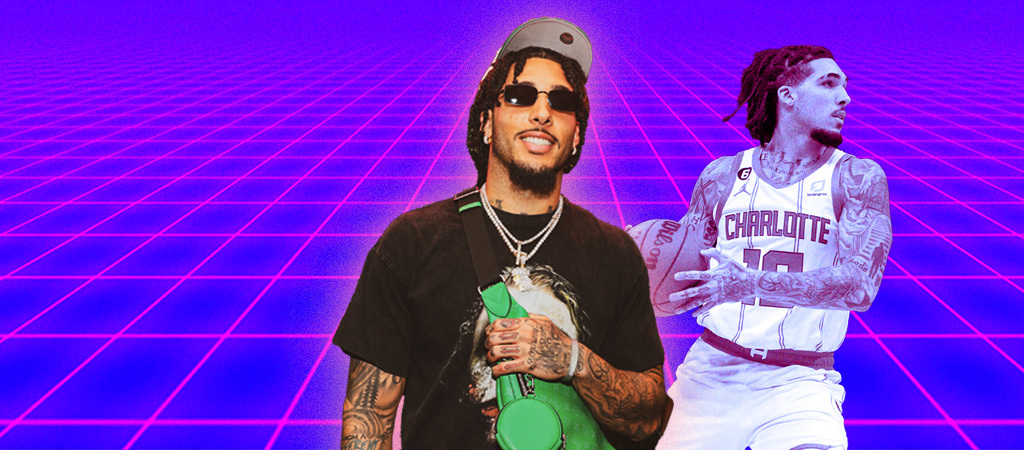
It’s a new year, but some things remain as they ever were; basketball players still want to rap, and nostalgia still dominates discussion of both art forms. That’s why “Tweaker,” the new single from G3 — better known as LiAngelo Ball, the middle sibling of the athletic trio — has arrived at the perfect time to set the tone for the year ahead.
The song, which takes stylistic cues from turn-of-the-millennium Cash Money Records, has become a fan favorite over the weekend. Memesters have incorporated into cheeky music videos mimicking the aesthetics of the early aughts — ultra baggy jeans, tall white tees, and color-coordination from the fitted caps to the sneakers — and social media users have joked that the dissident sibling may have found his niche despite not joining Lonzo and LaMelo in the NBA.
It doesn’t hurt that he sounds confident and personable on the track, something a lot of his athletic peers have struggled with in their forays into the studio. Maybe he got that from his dad, who somehow charmed his way into stardom as the driving force behind his sons’ respective hustles into the NBA.
So, why has this song resonated with rap fans, NBA fans, and everyone in between — especially considering that the former two groups can’t even seem to agree on anything going on within their own cohorts? This is how I see it:
Firstly, trends come and go in cycles. It was only a matter of time until the musical trends in rap eventually circled back around to recapture the glory days of spinning rims and Motif synths. After all, as evidenced by the hype rushes for 2024 standouts like Megan Thee Stallion’s Megan, Doechii’s Alligator Bites Never Heal, and particularly, Ice Spice’s Y2K!, millennial nostalgia is very in right now — especially for those who may only have caught its tail end in the first place. Heck, there were no fewer than four major feature films about the era, one of which went extremely viral for how wrong it got all the details.
Likewise, big hits of recent years, like Latto’s “Big Energy,” Jack Harlow’s “First Class,” and The Weeknd’s “Creepin’” had made use of prominent samples from the late ’90s and 2000s, priming pop culture for a big resurgence of such sounds (I called this back in my review of Harlow’s second album That’s What They All Say back in 2020). As the samples became more prominent, so too did demands that artists get back to original sounds. What better way to recapture the magic from those singles than duplicating the production styles and flows from noughties hits like Big Tymers’ “Still Fly” or T.I.’s “Motivation?”
At the same time, hip-hop has reached a bit of an impasse; the trap sounds that have dominated the past decade don’t hit like they used to — just see the lukewarm or divided receptions of nominal chart-toppers like Lil Baby, or the way basically everybody turned on Drake last year. Folks are looking for something fresh — and in all forms of art and entertainment, inspiration is often gleaned by taking note of past trends and reinterpreting them for modern audiences (Nosferatu and Wicked, anyone?).
Heck, even basketball fans are yearning for a more “back to basics” approach to the game — which is really just a nostalgic grasp for cultural relevancy and a second childhood to appreciate youth. The main cohort of commentators with the loudest platforms complaining about the number of threes being taken in a game is made up mostly of people entering middle age — LeBron James turned 40 last month, remember — who are rapidly realizing that their best days (or at least, the least painful ones) might be behind them.
Combine that with a younger generation just entering the stage in which they finally yearn to be taken seriously by their elders — think Meg hitting 30 next month — means that the time is absolutely ripe for a cohort of artists seeing 30 on the horizon to finally start making appeals to their forebears as they realize they’re closer to us than they are the next group of kids who will break the paradigm in the decade ahead.
The fact that it’s LiAngelo Ball, a product of both hip-hop and the sports world, who cracked the code is one of those funny quirks of fate that looks inevitable in hindsight. Like a bunch of NBA players, he wants to make music as much as he wants to hoop; unlike Damian Lillard or Bones Hyland, he isn’t currently on an active roster, which means fans can perceive him as a rapper who used to hoop. Maybe that’s made them more receptive. Maybe it really was fate.
But either way, he’s given us a glimpse of the future of hip-hop, which sounds a lot like its past. So, dust off that throwback — which is now a throwback squared — and get ready for a nostalgic revival of the Y2K sound.
